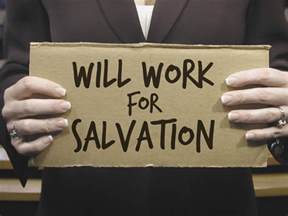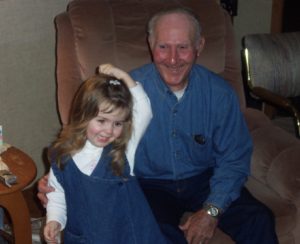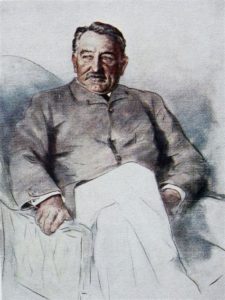This is part two of a devotion on Assurance. If you have not done so, you should read Part 1 first…
First of all, I think it is a misunderstanding of the gospel of salvation.
The Gospel is the Good News that Christ died for me and if I believe that I have eternal life.
There are about 40 things that happen at that moment in time when we believe on the Lord Jesus Christ, none of which are visible on the outside.
These things are automatic. But there are many things that can happen because of our new power and standing… but those are not automatic. When things that may hopefully be a result of the gospel are made a part of salvation, that is when we begin to lack assurance.
Listen to these verses. They are simply stated.
Acts 16:31 says, “believe in the Lord Jesus Christ, and you will be saved.”
and you will be saved.”
Romans 10:13 says, “Everyone who calls upon the name of the Lord shall be saved.
John 3:36 says, “Whoever believes in the Son has eternal life, but whoever rejects the Son will not see life, for God’s wrath remains on him.
Romans 8:1- “there is no condemnation for those who are in Christ Jesus.”
This is relationship. This is justification. This is instaneous. It is fully realized.
There are other verses that are fellowship. It is called sanctification. They are progressive. They will be realized in different degrees in different lives.
 So feelings and experiences come and go, but the Word is forever. Don’t rely on the world around you for your assurance, but the promise that is within you.
So feelings and experiences come and go, but the Word is forever. Don’t rely on the world around you for your assurance, but the promise that is within you.
Romans 8:9 tells us, “You, however, are not in the flesh but in the spirit, if in fact the Spirit of God dwells in you. Anyone who does not have the Spirit of Christ does not belong to Him.”
but if we do have the Spirit, it tells us in Romans 8:16 that “The Spirit Himself bears witness with our spirit that we are children of God.” That means saved to eternal life.
In 1 John the words “we know” are used 14 times. John tends to stress what he is trying to get across in numerical ways.
In gospel of John he uses the verb Pis-te-oh or to believe 99 times. That is why it is called the belief book.
In John 1:12 says “to all who received Him, who believed in His name, he gave the power to become children of God.” To conclude the book of John in chapter 20 and verses 30-31 John records, “And truly Jesus did many other signs in the presence of His disciples, which are not written in this book; but these are written that you may believe that Jesus is the Christ, the Son of God, and that believing you may have life in His name.”
 So why do we doubt? First of all, the fact is that that many do not understand the gospel, and add subjective things to it that cannot be quantified.
So why do we doubt? First of all, the fact is that that many do not understand the gospel, and add subjective things to it that cannot be quantified.
They try to use subjective means to evaluate an objective truth.
Believing on Christ is a yes or no proposition, but when we add other things to it, it brings up hundreds of different questions.
One of the salvation tests that people use comes from James- loving the brethren. Now I have questions…. How much, what ways, how long, and at what point is it not enough and I lose my salvation or prove that I never had it. Loving people is so subjective and God did not give us a formula to follow.
or prove that I never had it. Loving people is so subjective and God did not give us a formula to follow.
So the first place to look for the lack of assurance is adding good works to the salvation mix.
The other night I awoke at about 4 in the morning thinking about this devotion.
I watch a lot of old western shows. (you know the ones. when guys are shot it make a red blotch but doesn’t make a hole in the shirt) and I got this picture of a train waiting at the station. It was called Salvation Station  destination Heaven.
destination Heaven.
And the steam engine was called grace. The cars behind the engine carried our works. My Sunday school class was in there. Dave Smith had a few jalopies he had fixed up for some poor families, John Miller had some homeless guys he had shared the gospel with, and John Oltman and Pete had a toolbox the size of a railroad car.
But what I noticed was that none of those cars contributed anything to the trip. They had no engine, no power, some had  lots of cars, some had few, some were loaded, some were almost empty.
lots of cars, some had few, some were loaded, some were almost empty.
The key was the engine. Without it nothing left the station. We are like that. Without the Grace of God through our Lord Jesus Christ, all of our works are fruitless. We would look like those sad railroad yards with loaded or empty cars just sitting. Our works go to heaven for rewards, but they do not contribute in any way to the journey. That is all in Christ.
 Another reason we doubt is because of feelings. We just don’t feel saved. Maybe we saw someone’s conversion and they had emotion we never experienced.
Another reason we doubt is because of feelings. We just don’t feel saved. Maybe we saw someone’s conversion and they had emotion we never experienced.
They sob or scream or dance a jig or maybe do all three and we didn’t feel that way when we were saved. Maybe ours was not real. But even though it looks like those converts got a dose of old-time religion, it really doesn’t mean a thing. As an old pastor once said, “You can’t tell by the honk of the horn how much gas is in the tank.”
Your conversion experience was your own; don’t measure it against any others. So, our feelings will fluctuate. Our  emotions are unreliable.“Doubt my feelings what they will… Jesus is my savior still.” We are just as saved when we feel bad as when we feel good. We not saved because we feel good, we feel good because we are saved. Why do I know I am saved, because the Bible tells me so.
emotions are unreliable.“Doubt my feelings what they will… Jesus is my savior still.” We are just as saved when we feel bad as when we feel good. We not saved because we feel good, we feel good because we are saved. Why do I know I am saved, because the Bible tells me so.
Another reason we doubt is because we don’t have an incredible testimony like some others.
Some people have a theatrical testimony. A book or movie just waiting to happen. They came from a life that we have never experienced. Maybe we  didn’t go from bad boy to good boy, we went from good boy to forgiven boy. So maybe outwardly we haven’t changed that much.
didn’t go from bad boy to good boy, we went from good boy to forgiven boy. So maybe outwardly we haven’t changed that much.
Believe me, we were every bit as bad as that bad boy in God’s eyes. We shouldn’t sell ourselves short. We are professional sinners and the changes that took place in us were just as drastic as the ones that took place in the motorcycle gang leader that came to Christ in a lonely backwoods bar.
Finally, a big part of doubt is not remembering a certain place or time. My assurance does not rest on my ability to remember, it is based on God remembering me. My memory of what happened does not affect what did happen.
A man goes into the doctor. “There is something wrong with me. I can’t remember anything.”
“Sit down, let’s talk about it.”
“Talk about what?”
DL Moody once said, “It is not necessary  that we should be able to tell where or how we have been converted, but it is important that we should be able to say that we are converted.”
that we should be able to tell where or how we have been converted, but it is important that we should be able to say that we are converted.”
Old Scottish lady who was admonished by her minister for being too certain of her salvation. She said, “If I am not saved Christ has more to lose than me.” Before the indignant preacher could voice his dismay she said, “All I have to lose is my salvation, but Christ will lose His integrity.” She is right, that would make God a liar. And He cannot lie.
Hebrews 6:18 “So that by two unchangeable things, in which it is  impossible for God to lie, we who have fled for refuge might have strong encouragement to hold fast to the hope set before us.”
impossible for God to lie, we who have fled for refuge might have strong encouragement to hold fast to the hope set before us.”
Titus 1:2 “In the hope of eternal life, which God who never lies, promised before time began.
Romans 3:3-4 “What if some were unfaithful? Does their faithlessness nullify the faithfulness of God? By no means, Let God be true though everyone be a liar, as it is written, “That you may be justified in your words, and prevail when you are judged.”
John 14:6 “I am the way, the truth, and the life. No one comes to Father but by me.
You know there is an old saying that says,  “God said it, I believe it, and that settles it.” But that is not true. It should be “God said it and that settles it, whether I believe it or not.”
“God said it, I believe it, and that settles it.” But that is not true. It should be “God said it and that settles it, whether I believe it or not.”
When Jesus went to the tomb of the late Lazarus, Martha says to Jesus, “If you would have been here, my brother would not have died, but even now I know that God will give you whatever you wish.” Jesus said Lazarus will rise again, but Martha thought he was talking about the final resurrection and said she knew that.
Jesus then said, “I am the resurrection and the life.  The one who believes in me will live, even though they die; and whosoever lives by believing in me will never die.”
The one who believes in me will live, even though they die; and whosoever lives by believing in me will never die.”
Then He asked Martha the question that he asks all of us…. “Do you believe this?”
Martha said yes. “I believe that you are the Messiah, the Son of God, who is come into this world.”
 So can we believe Jesus when He says, “ I am the way the truth and the life no one comes to the father but by me, “ And then asks, “Do you believe this?” If we say yes, even though we die we will never die. Be assured.
So can we believe Jesus when He says, “ I am the way the truth and the life no one comes to the father but by me, “ And then asks, “Do you believe this?” If we say yes, even though we die we will never die. Be assured.



















































































